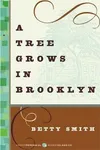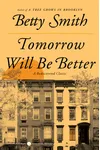Picture a Brooklyn-born storyteller who spun the grit and hope of tenement life into literary gold—meet Betty Smith! Best known for her 1943 bestseller A Tree Grows in Brooklyn, Smith transformed her working-class roots into heartfelt narratives that still tug at readers’ hearts. With a knack for blending raw realism with glimmers of optimism, she carved out a timeless place in American literature.
The Making of Betty Smith
Born Elisabeth Lillian Wehner on December 15, 1896, in Brooklyn’s Williamsburg, Betty grew up in a world of immigrant struggles. Her German-American parents, John and Catherine Wehner, faced poverty, and her father’s alcoholism cast a shadow over their tenement life. Forced to leave school after eighth grade, young Betty worked odd jobs, from factory floors to clerical desks, but her love for books bloomed at the local library. At 19, she married George H.E. Smith and moved to Michigan, where she petitioned to attend high school as a married woman—a bold move! Though she never graduated, the University of Michigan welcomed her as a special student, sparking her passion for writing.
Betty Smith’s Unforgettable Stories
Smith’s breakthrough came with A Tree Grows in Brooklyn (1943), a semi-autobiographical novel about Francie Nolan, a girl navigating poverty and dreams in early 20th-century Brooklyn. Its vivid prose and heartfelt portrayal of resilience made it an instant hit, selling millions and inspiring a 1945 film and a 1951 musical. Her follow-up, Tomorrow Will Be Better (1947), explored young love and hardship in 1920s Brooklyn, earning praise for its unpretentious style despite mixed reviews. Maggie-Now (1958) delved into a housewife’s quiet strength, while Joy in the Morning (1963) drew on Smith’s Michigan years, capturing young marriage with tender humor. Smith’s style—clear, sincere, and rich with blue-collar life—made her a cultural historian of the American experience.
Before novels, Smith honed her craft as a playwright, winning the prestigious Avery Hopwood Award in 1931 at Michigan and studying at Yale Drama School. She penned over 70 one-act plays, many reflecting the same gritty optimism as her fiction. Her works, whether on stage or page, wove hope and resilience into the struggles of everyday people, earning her a loyal following.
Why Betty Smith Matters
Betty Smith’s legacy lies in her ability to give voice to the overlooked—immigrants, working-class women, and dreamers in a harsh world. A Tree Grows in Brooklyn became a lifeline for WWII soldiers, with thousands of fan letters pouring in yearly. Translated into 16 languages and never out of print, it remains a touchstone for readers seeking stories of grit and grace. Smith’s honest portrayal of human emotions inspired later authors, and her focus on psychological depth set her apart as a chronicler of the early 20th century. Her life, marked by three marriages and relentless perseverance, mirrors the tenacity of her characters.
- Birth: December 15, 1896, Brooklyn, NY
- Key Works: A Tree Grows in Brooklyn, Tomorrow Will Be Better, Maggie-Now, Joy in the Morning
- Awards: Avery Hopwood Award (1931), Rockefeller Fellowship (1939)
Ready to step into Betty Smith’s Brooklyn? Grab A Tree Grows in Brooklyn and lose yourself in her heartfelt, hopeful world!



